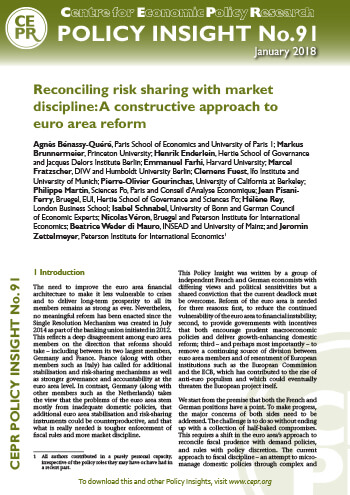External authors
Book/Special report


Instruments of a strategic foreign economic policy
Study for the German Federal Foreign Office produced by Bruegel, the Kiel Institute for the World Economy and DIW Berlin.
External authors
Book/Special report


Study for the German Federal Foreign Office produced by Bruegel, the Kiel Institute for the World Economy and DIW Berlin.
External Publication

This publication, written by a group of independent French and German economists, proposes six reforms which, if delivered as a package, would improve the Eurozone’s financial stability, political cohesion, and potential for delivering prosperity to its citizens, all while addressing the priorities and concerns of participating countries.
Opinion















In a piece signed by 15 leading French and German economists, Nicolas Véron lays out a path to a more sustainable Euro. Germany will need to accept some form of risk sharing. France will need to allow more market discipline. But the two countries can find a common vision for reforms
Opinion







What would happen if the ECB failed to respond to the excessively low inflation and the weak economy? And what economic policy would be suitable under the current circumstances, if not monetary policy?
Opinion


The current link between debt servicing and membership of the single currency leads to a vicious circle that increases uncertainty, weakens growth and makes full debt repayment less likely. There will be no confidence and no growth in Greece without a solution to the debt problem.
Opinion


Die Verknüpfung von Schuldendienst mit der Mitgliedschaft in der Währungsunion führt zu einem Teufelskreis, der das Wachstum schwächt und damit eine Rückzahlung der Schulden unwahrscheinlicher macht. Wir schlagen vor, den Teufelskreis durch eine Bindung der Kreditzinsen an das Wachstum der griechischen Wirtschaft zu durchbrechen. Ein Griechenland ohne Wachstum soll keine Zinsen und keine Tilgung zahlen. Je stärker das Wachstum, desto höher die Zinsen und Rückzahlungen an die europäischen Gläubiger.
Blog Post



German opposition to government-bond purchases by the European Central Bank is solidifying ahead of the programme’s likely announcement on January 22. Elections in Greece that could bring a government that will seek to negotiate the country’s debt with official creditors puts the ECB’s decision under even greater scrutiny. The fact that the ECB did not share losses in the previous round of Greek debt restructuring highlights the problem of sovereign QE, which is not feasible or will be ineffective if fiscal implications are excluded. The design of the programme is therefore crucial.
Opinion



Die Sorgen über die Auswirkungen und die Effektivität des Programms sind groß. Die EZB muss vorsichtig die Kosten und Risiken – vor allem die Umverteilung von fiskalischen Risiken – gegen die Vorteile ihrer Geldpolitik abwägen. Ein gut durchdachtes Programm kann jedoch erfolgreich sein. Der Schlüssel für seinen Erfolg liegt bei seiner glaubwürdigen Ausgestaltung.
Opinion



The ECB must achieve price stability in the euro area and contribute to the general economic objectives of the Union, if its price stability mandate allows. At the same time it is also clear that governments continue to bear responsibility.